10 mar 2019
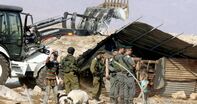
The Israeli occupation army on Sunday demolished a poultry house and uprooted dozens of trees near al-Arroub refugee camp, north of al-Khalil.
Local activist Mohamed Awad said that Israeli bulldozers escorted by employees and soldiers from the Israeli army’s civil administration removed a poultry house and uprooted dozens of fruitful trees in Abu Suda area near al-Arroub camp.
Awad added that the poultry house, which was built on 600 square meters of land, belonged to a local resident called Khaled as-Samaheen.
Three years ago, the Israeli army had demolished a poultry house on the same land.
Local activist Mohamed Awad said that Israeli bulldozers escorted by employees and soldiers from the Israeli army’s civil administration removed a poultry house and uprooted dozens of fruitful trees in Abu Suda area near al-Arroub camp.
Awad added that the poultry house, which was built on 600 square meters of land, belonged to a local resident called Khaled as-Samaheen.
Three years ago, the Israeli army had demolished a poultry house on the same land.
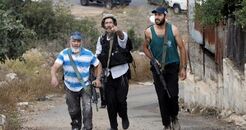
Jewish settlers on Sunday bulldozed a vast tract of Palestinian-owned agricultural land in Jalud village, south of Nablus in the occupied West Bank.
Local official Ghassan Daghlas said that Jalud villagers discovered in the morning that their lands were razed and spoilt by bulldozers belonging to settlers from the nearby illegal outposts of Ahiya and Esh Kodesh, adding that local farmers had already been banned from reaching their lands by Israeli soldiers.
Daghlas affirmed that the Israeli occupation army prevents farmers from cultivating their lands in the eastern plain of the village.
He said that the settlers bulldozed more than 10 dunums of Palestinian land, deployed water pipelines, planted trees for them on parts of the land, and transported a large amount of soil from the plain to their outposts.
During the past two years, the Israeli army deliberately prevented local farmers from harvesting 250 dunums of wheat on this land, which led to the devastation of all crops.
In a separate incident, a group of settlers attacked Palestinian shepherds in the Jordan Valley of Tuba province and unleashed their dogs on their sheep.
Some sheep were badly hurt by the settlers’ dogs, according to local official Omar Faqha.
Local official Ghassan Daghlas said that Jalud villagers discovered in the morning that their lands were razed and spoilt by bulldozers belonging to settlers from the nearby illegal outposts of Ahiya and Esh Kodesh, adding that local farmers had already been banned from reaching their lands by Israeli soldiers.
Daghlas affirmed that the Israeli occupation army prevents farmers from cultivating their lands in the eastern plain of the village.
He said that the settlers bulldozed more than 10 dunums of Palestinian land, deployed water pipelines, planted trees for them on parts of the land, and transported a large amount of soil from the plain to their outposts.
During the past two years, the Israeli army deliberately prevented local farmers from harvesting 250 dunums of wheat on this land, which led to the devastation of all crops.
In a separate incident, a group of settlers attacked Palestinian shepherds in the Jordan Valley of Tuba province and unleashed their dogs on their sheep.
Some sheep were badly hurt by the settlers’ dogs, according to local official Omar Faqha.
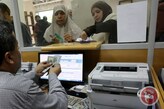
The next payment of Qatari financial funds to Hamas officials in the besieged Gaza Strip will be transferred under the form of payment for "authorized projects" through bank transfers instead of briefcases, on Sunday.
According to Haaretz news outlet, the financial aid will be transferred as payment for "authorized projects," instead of briefcases, which were previously used to allow entry of financial funds to Gaza.
Sources also mentioned that Israeli defense officials are concerned about "possible violent escalation" in Gaza and the West Bank due to the upcoming anniversary of "The Great March of Return" weekly protests along the eastern borders of Gaza.
The majority of the nearly two million Palestinians in the Gaza Strip are sealed inside the coastal enclave due to the continuation of the military blockade imposed by Israel and upheld by Egypt on the southern border.
Gaza's residents endure distressing living conditions, including a shortage of safe drinking water and regular power cuts, partly due to a lack of fuel for Gaza's power plant, as well as receiving an average of just four hours of electricity per day.
The destruction from three Israeli offensives over the past six years, including damage to the enclave's water, sanitation, energy, and medical facilities, coupled with slow reconstruction due to the blockade led the UN to warn that Gaza could be "uninhabitable" by 2020.
According to Haaretz news outlet, the financial aid will be transferred as payment for "authorized projects," instead of briefcases, which were previously used to allow entry of financial funds to Gaza.
Sources also mentioned that Israeli defense officials are concerned about "possible violent escalation" in Gaza and the West Bank due to the upcoming anniversary of "The Great March of Return" weekly protests along the eastern borders of Gaza.
The majority of the nearly two million Palestinians in the Gaza Strip are sealed inside the coastal enclave due to the continuation of the military blockade imposed by Israel and upheld by Egypt on the southern border.
Gaza's residents endure distressing living conditions, including a shortage of safe drinking water and regular power cuts, partly due to a lack of fuel for Gaza's power plant, as well as receiving an average of just four hours of electricity per day.
The destruction from three Israeli offensives over the past six years, including damage to the enclave's water, sanitation, energy, and medical facilities, coupled with slow reconstruction due to the blockade led the UN to warn that Gaza could be "uninhabitable" by 2020.
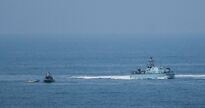
The Israeli occupation navy on Sunday morning kidnapped two fishermen and confiscated their boat off the northern coast of the besieged Gaza Strip.
A reporter for the Palestinian Information Center (PIC) said that Israeli gunboats encircled a small fishing boat off the shore of Beit Lahia, rounded up two fishermen aboard it and seized their boat.
He affirmed that the detained fishermen were working aboard their boat within the permitted fishing area in the northern waters of Gaza.
Last Friday, the Israeli occupation navy kidnapped four Palestinian fishermen in the northern waters of Gaza.
Israeli gunboats are around Gaza fishermen almost every day, harassing them, shooting at them, damaging their boats, and making arrests. Sometimes fishermen are injured or killed during gunfire attacks.
Under the 1993 Oslo accords, Palestinian fishermen are permitted to fish up to 20 nautical miles off the coast of Gaza, but since then Israel has kept reducing the fishing area gradually to a limit of three nautical miles as part of its blockade on Gaza.
Fishermen and human rights groups also say that since the 2008-09 war in Gaza, the Israeli army has been regularly enforcing a limit even closer to the shore.
A reporter for the Palestinian Information Center (PIC) said that Israeli gunboats encircled a small fishing boat off the shore of Beit Lahia, rounded up two fishermen aboard it and seized their boat.
He affirmed that the detained fishermen were working aboard their boat within the permitted fishing area in the northern waters of Gaza.
Last Friday, the Israeli occupation navy kidnapped four Palestinian fishermen in the northern waters of Gaza.
Israeli gunboats are around Gaza fishermen almost every day, harassing them, shooting at them, damaging their boats, and making arrests. Sometimes fishermen are injured or killed during gunfire attacks.
Under the 1993 Oslo accords, Palestinian fishermen are permitted to fish up to 20 nautical miles off the coast of Gaza, but since then Israel has kept reducing the fishing area gradually to a limit of three nautical miles as part of its blockade on Gaza.
Fishermen and human rights groups also say that since the 2008-09 war in Gaza, the Israeli army has been regularly enforcing a limit even closer to the shore.
9 mar 2019
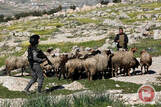
Israeli forces detained six Palestinians, on Saturday, from the Farisiyeh area in the northern Jordan Valley in the northern occupied West Bank.
Omar Fuqaha, a Palestinian official in Tubas, reported that Israeli forces detained four Palestinian shepherds and two activists, pointing out that the shepherds were herding their sheep in al-Farisiyeh.
The two activists were with the shepherds when Israeli settlers chased them out of the fields where they were herding their sheep; Israeli forces then arrived the detained all four shepherds and two activists.
Palestinian residents of the Jordan Valley regularly face evacuations and interruption due to Israeli military exercises on or near their land. The district of Tubas, meanwhile, is one of the occupied West Bank's most important agricultural centers.
The majority of the Jordan Valley is under full Israeli military control, despite being within the West Bank. Meanwhile, at least 44% of the total land in the Jordan Valley has been re-appropriated by Israeli forces for military purposes and training exercises.
Forming a third of the occupied West Bank and with 88 percent of its land classified as Area C, the Jordan Valley has long been a strategic area of land unlikely to return to Palestinians following Israel's occupation in 1967.
Between 500,000 and 600,000 Israelis live in Jewish-only settlements across occupied East Jerusalem and the West Bank in violation of international law, with recent announcements of settlement expansion provoking condemnation from the international community.
The Palestinian government has no jurisdiction over Israelis in the West Bank, and acts carried out by Israeli settlers often occur in the presence of Israeli military forces who rarely act to protect Palestinian residents.
Omar Fuqaha, a Palestinian official in Tubas, reported that Israeli forces detained four Palestinian shepherds and two activists, pointing out that the shepherds were herding their sheep in al-Farisiyeh.
The two activists were with the shepherds when Israeli settlers chased them out of the fields where they were herding their sheep; Israeli forces then arrived the detained all four shepherds and two activists.
Palestinian residents of the Jordan Valley regularly face evacuations and interruption due to Israeli military exercises on or near their land. The district of Tubas, meanwhile, is one of the occupied West Bank's most important agricultural centers.
The majority of the Jordan Valley is under full Israeli military control, despite being within the West Bank. Meanwhile, at least 44% of the total land in the Jordan Valley has been re-appropriated by Israeli forces for military purposes and training exercises.
Forming a third of the occupied West Bank and with 88 percent of its land classified as Area C, the Jordan Valley has long been a strategic area of land unlikely to return to Palestinians following Israel's occupation in 1967.
Between 500,000 and 600,000 Israelis live in Jewish-only settlements across occupied East Jerusalem and the West Bank in violation of international law, with recent announcements of settlement expansion provoking condemnation from the international community.
The Palestinian government has no jurisdiction over Israelis in the West Bank, and acts carried out by Israeli settlers often occur in the presence of Israeli military forces who rarely act to protect Palestinian residents.
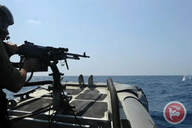
Israeli naval forces opened fire at Palestinian fishermen off the coast of the besieged Gaza Strip, on Saturday morning.
Locals reported that Israeli war boats opened fire at Palestinian fishing boats off the coast of al-Sudaniya in the northern Gaza Strip.
Sources added that Israeli naval forces also opened fire targeting fishermen off the coast of Sheikh Ajlin area in western Gaza City.
Fishermen were forced to head back to shore in fear for their lives; no injuries were reported.
Israeli warplanes had carried out several airstrikes across Gaza, earlier Saturday, targeting sites allegedly belonging to the Hamas movement.
As part of Israel's blockade of the coastal enclave since 2007, the Israeli army, citing security concerns, requires Palestinian fishermen to work within a limited "designated fishing zone," the exact limits of which are decided by the Israeli authorities and have historically fluctuated.
The Israeli army regularly detains and opens fire on unarmed Palestinian fishermen, shepherds, and farmers along the border areas if they approach the unilaterally declared buffer zone.
Israeli human rights group B'Tselem recently concluded that Israel's Gaza closure and "harassment of fishermen" have been "destroying Gaza's fishing sector," with 95 percent of fishermen living below the poverty line.
Locals reported that Israeli war boats opened fire at Palestinian fishing boats off the coast of al-Sudaniya in the northern Gaza Strip.
Sources added that Israeli naval forces also opened fire targeting fishermen off the coast of Sheikh Ajlin area in western Gaza City.
Fishermen were forced to head back to shore in fear for their lives; no injuries were reported.
Israeli warplanes had carried out several airstrikes across Gaza, earlier Saturday, targeting sites allegedly belonging to the Hamas movement.
As part of Israel's blockade of the coastal enclave since 2007, the Israeli army, citing security concerns, requires Palestinian fishermen to work within a limited "designated fishing zone," the exact limits of which are decided by the Israeli authorities and have historically fluctuated.
The Israeli army regularly detains and opens fire on unarmed Palestinian fishermen, shepherds, and farmers along the border areas if they approach the unilaterally declared buffer zone.
Israeli human rights group B'Tselem recently concluded that Israel's Gaza closure and "harassment of fishermen" have been "destroying Gaza's fishing sector," with 95 percent of fishermen living below the poverty line.
8 mar 2019
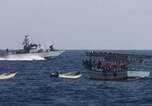
Israeli navy ships attacked, Friday, several fishing boats in Palestinian territorial waters, northwest of Gaza city, abducted four fishermen and confiscated their boat.
The WAFA Palestinian News Agency has reported that the navy fired many live rounds at fishing boats, and chased them, before surrounding one boat in the Sudaniyya Sea area, and abducted four fishermen.
The abducted fishermen have been identified as Yasser Salman Bakr, Tamer Suleiman Bakr, Waleed Mohsin Bakr and Yosri Zakariya Bakr.
The soldiers forced the fishermen to undress and swim towards their boat, before cuffing and blindfolding them, and took them along with their boat to Ashdod Port.
The navy frequently attacks the Palestinian fishermen and their boats in Gaza territorial waters, in the besieged and impoverished coastal region.
Besides causing serious damage to boats, and confiscating many of them, the attacks have also led to hundreds of casualties, including many fatalities.
The WAFA Palestinian News Agency has reported that the navy fired many live rounds at fishing boats, and chased them, before surrounding one boat in the Sudaniyya Sea area, and abducted four fishermen.
The abducted fishermen have been identified as Yasser Salman Bakr, Tamer Suleiman Bakr, Waleed Mohsin Bakr and Yosri Zakariya Bakr.
The soldiers forced the fishermen to undress and swim towards their boat, before cuffing and blindfolding them, and took them along with their boat to Ashdod Port.
The navy frequently attacks the Palestinian fishermen and their boats in Gaza territorial waters, in the besieged and impoverished coastal region.
Besides causing serious damage to boats, and confiscating many of them, the attacks have also led to hundreds of casualties, including many fatalities.
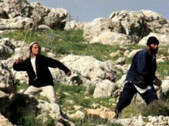
A group of Israeli colonialist settlers living illegally on Palestinian lands in the West Bank’s Northern Plains, attacked many Palestinian shepherds, Friday, in several areas, and chased them away.
Palestinian nonviolent activist against Israel’s illegal colonialist activities, Aref Daraghma, said the colonists attacked the shepherds, and chased them along with their sheep out of the areas of Shwei’er, al-Farisiyya and al-Himma.
In addition, Burhan Bisharat, a local of Khirbat Makhoul village, in the Northern Plains, said many colonists gathered near a water well, used by the shepherds for their livestock, raising fears among the residents that the colonists might have poisoned the water, similar to previous incidents.
It is worth mentioning that the colonists frequently assault the shepherds, and in some cases killed their sheep, in order to force them out of the grazing lands.
Palestinian nonviolent activist against Israel’s illegal colonialist activities, Aref Daraghma, said the colonists attacked the shepherds, and chased them along with their sheep out of the areas of Shwei’er, al-Farisiyya and al-Himma.
In addition, Burhan Bisharat, a local of Khirbat Makhoul village, in the Northern Plains, said many colonists gathered near a water well, used by the shepherds for their livestock, raising fears among the residents that the colonists might have poisoned the water, similar to previous incidents.
It is worth mentioning that the colonists frequently assault the shepherds, and in some cases killed their sheep, in order to force them out of the grazing lands.
7 mar 2019
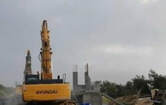
Israeli soldiers invaded, on Thursday at dawn, the village of Burqa, north of the northern West Bank city of Nablus, and demolished a two-story home.
Media sources said the soldiers, accompanied by bulldozers, invaded the al-Mas’udiyya area in Burqa village, and demolished the home of Moshir Suleiman Saif.
Ghassan Daghlas, a Palestinian Authority official in charge of Israeli colonies file in northern West Bank, said the soldiers demolished the home “for being built without a permit, in Area C” of the occupied West Bank.
Daghlas added that the owner did not receive a prior notice for the demolition of his property.
Also at dawn, the army invaded Kobar village, north of the central West Bank city of Ramallah, and demolished a home owned an imprisoned father, who was abducted with his son in December of last year, and is also the father a young man, who was killed by the army on December 12th, 2018.
In related news, the soldiers handed demolition orders targeting four homes and structures, used by Palestinian farmers in Shoshahla village, in the al-Khader town, south of Bethlehem.
The properties targeted with the demolition orders are owned by Ali Mahmoud Salah, Monther Salah, Mousa Ahmad Salah and Habbas Khalil Salah.
The army claimed the properties were built without a permit from the “Civil Administration Office,” the administrative branch of Israel’s illegal occupation in the West Bank.
Media sources said the soldiers, accompanied by bulldozers, invaded the al-Mas’udiyya area in Burqa village, and demolished the home of Moshir Suleiman Saif.
Ghassan Daghlas, a Palestinian Authority official in charge of Israeli colonies file in northern West Bank, said the soldiers demolished the home “for being built without a permit, in Area C” of the occupied West Bank.
Daghlas added that the owner did not receive a prior notice for the demolition of his property.
Also at dawn, the army invaded Kobar village, north of the central West Bank city of Ramallah, and demolished a home owned an imprisoned father, who was abducted with his son in December of last year, and is also the father a young man, who was killed by the army on December 12th, 2018.
In related news, the soldiers handed demolition orders targeting four homes and structures, used by Palestinian farmers in Shoshahla village, in the al-Khader town, south of Bethlehem.
The properties targeted with the demolition orders are owned by Ali Mahmoud Salah, Monther Salah, Mousa Ahmad Salah and Habbas Khalil Salah.
The army claimed the properties were built without a permit from the “Civil Administration Office,” the administrative branch of Israel’s illegal occupation in the West Bank.
6 mar 2019
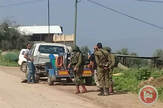
Israeli forces and the Israeli Civil Administration cut off water supply for dozens of Palestinians living in communities in Bardala village in the Jordan Valley in the northern occupied West Bank, on Wednesday.
Mutaz Bisharat, an official who monitors settlement activity in Tubas/Jordan Valley, told Ma'an that Israeli forces cut off water supply for 60% of residents of the Bardala village; that is 2600 people.
Israeli forces also cut off water supply for 1800-2000 dunams of Palestinian agricultural lands that must be continuously irrigated.
Bisharat added that Israel claims that water sources supplying residents with water are illegal, stressing that the water comes from water wills in the village and inside Palestinian lands.
He pointed out that as Israeli forces cut off water supply for Palestinians, they construct water wills for Israeli settlers.
Bisharat called upon international and humanitarian institutions to immediately intervene to stop Israeli violations of human rights.
The Jordan Valley forms a third of the occupied West Bank, with 88 percent of its land classified as Area C -- under full Israeli military control.
Water allocations are very necessary for the increase of agricultural production, in order to support the economic growth of many Palestinian farmers.
Jordan Valley residents mostly live in enclaves closed off by Israeli military zones, checkpoints, and more than 30 illegal Israeli settlements.
Mutaz Bisharat, an official who monitors settlement activity in Tubas/Jordan Valley, told Ma'an that Israeli forces cut off water supply for 60% of residents of the Bardala village; that is 2600 people.
Israeli forces also cut off water supply for 1800-2000 dunams of Palestinian agricultural lands that must be continuously irrigated.
Bisharat added that Israel claims that water sources supplying residents with water are illegal, stressing that the water comes from water wills in the village and inside Palestinian lands.
He pointed out that as Israeli forces cut off water supply for Palestinians, they construct water wills for Israeli settlers.
Bisharat called upon international and humanitarian institutions to immediately intervene to stop Israeli violations of human rights.
The Jordan Valley forms a third of the occupied West Bank, with 88 percent of its land classified as Area C -- under full Israeli military control.
Water allocations are very necessary for the increase of agricultural production, in order to support the economic growth of many Palestinian farmers.
Jordan Valley residents mostly live in enclaves closed off by Israeli military zones, checkpoints, and more than 30 illegal Israeli settlements.
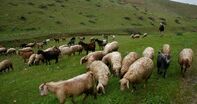
A horde of Jewish settlers on Tuesday brutalized Palestinian shepherds and expelled them from an open area of pasture in the northern Jordan Valley, east of the occupied West Bank.
Local official Aref Daraghmeh reported settlers escorted by soldiers forced local shepherds to leave a vast tract of grassland in the areas of Khilat Hamad and al-Farisiya in the northern Jordan Valley.
Palestinian shepherds in the northern Jordan Valley are exposed, almost on a daily basis, to harassment and assaults by Jewish settlers who live in illegal outposts and settlements in the region.
Local official Aref Daraghmeh reported settlers escorted by soldiers forced local shepherds to leave a vast tract of grassland in the areas of Khilat Hamad and al-Farisiya in the northern Jordan Valley.
Palestinian shepherds in the northern Jordan Valley are exposed, almost on a daily basis, to harassment and assaults by Jewish settlers who live in illegal outposts and settlements in the region.
4 mar 2019
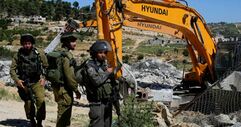
Israeli bulldozers on Monday morning demolished Palestinian structures used for commercial and agricultural purposes near Haris town, east of Salfit city.
According to local sources, Israeli troops provided protection for the bulldozers as they were knocking down a car wash and two agricultural stores at the western junction of Haris.
The demolished structures had been built in 2019 and belonged to a local resident.
As always, the Israeli occupation army claimed the structures were located in Area C, which is under Israel’s control.
According to local sources, Israeli troops provided protection for the bulldozers as they were knocking down a car wash and two agricultural stores at the western junction of Haris.
The demolished structures had been built in 2019 and belonged to a local resident.
As always, the Israeli occupation army claimed the structures were located in Area C, which is under Israel’s control.
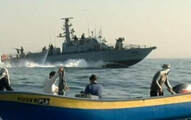
Israeli navy ships opened fire, on Monday morning, at several Palestinian fishing boats in Gaza territorial waters, close to the shore in the northern part of the besieged Gaza Strip.
Eyewitnesses said the fishermen were in the permitted fishing zone, and were just a few miles from the shore.
They added that the attack did not lead to any casualties, but the fishermen had to sail back to the shore to avoid further violations against them.
The Israeli army and the navy frequently attack Palestinian fishermen, farmers and workers in Gaza territorial waters, and in agricultural lands near the perimeter fence.
Eyewitnesses said the fishermen were in the permitted fishing zone, and were just a few miles from the shore.
They added that the attack did not lead to any casualties, but the fishermen had to sail back to the shore to avoid further violations against them.
The Israeli army and the navy frequently attack Palestinian fishermen, farmers and workers in Gaza territorial waters, and in agricultural lands near the perimeter fence.
3 mar 2019
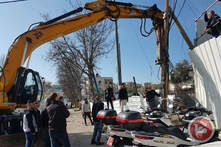
Israeli bulldozers demolished a Palestinian-owned car wash in the Beit Safafa neighborhood, in occupied East Jerusalem, on Sunday.
Local sources confirmed that Israeli forces stormed the neighborhood and completely demolished the car wash.
Sources pointed out that Israeli forces demolished the car wash under the pretext that it was built without the nearly-impossible to obtain Israeli permit.
However, locals claimed that the car wash was demolished as part of an Israeli settlement plan to expand the road, upon which the structure was built, and start the construction of a light rail route to the illegal Israeli settlement of Gilo.
According to Palestinians and rights groups, Israel’s overall goal, both in its policies in Area C and Israel’s settlement enterprise, is to depopulate the land of its Palestinian residents and replace them with Jewish Israeli communities in order to manipulate population demographics in all of historic Palestine.
Local sources confirmed that Israeli forces stormed the neighborhood and completely demolished the car wash.
Sources pointed out that Israeli forces demolished the car wash under the pretext that it was built without the nearly-impossible to obtain Israeli permit.
However, locals claimed that the car wash was demolished as part of an Israeli settlement plan to expand the road, upon which the structure was built, and start the construction of a light rail route to the illegal Israeli settlement of Gilo.
According to Palestinians and rights groups, Israel’s overall goal, both in its policies in Area C and Israel’s settlement enterprise, is to depopulate the land of its Palestinian residents and replace them with Jewish Israeli communities in order to manipulate population demographics in all of historic Palestine.
2 mar 2019
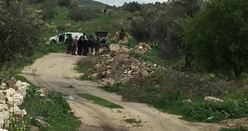
A horde of extremist Jewish settlers on Friday afternoon assaulted Palestinian farmers in Fara’ata village, east of Qalqilya.
Local sources told a reporter for the Palestinian Information Center (PIC) that a group of settlers escorted by soldiers brutalized farmers living in the eastern area of the village and threatened to attack them if they come again to their agricultural lands.
The sources added that the settlers also detained two cars belonging to local residents for a while and threatened to burn crops in plots of land belonging to Fara’ata farmers.
Local sources told a reporter for the Palestinian Information Center (PIC) that a group of settlers escorted by soldiers brutalized farmers living in the eastern area of the village and threatened to attack them if they come again to their agricultural lands.
The sources added that the settlers also detained two cars belonging to local residents for a while and threatened to burn crops in plots of land belonging to Fara’ata farmers.
